The guinea pigs are herbivores, so this means they don’t feed on other human foods, apart from produce. The produce is the primary food for cavies. By produce, we mean veggies and fruits, but there are also many other things that belong here, such as herbs and flowers.
But, can cavies eat certain herbs we use when we cook? They technically belong to things that grow from the ground. Let’s see this in details.
Can guinea pigs eat dill? Guinea pigs can eat dill. It is known to be great for vitamin supplementation in cavies diet. However, as with any food, even healthy foods, too much of anything is not good. Dill might be healthy and tasty for the cavy, but it also has some nutrients that might not be perfect for guinea pigs.
Just because dill is a herb, it doesn’t mean that it can be given in excess. But, why is this good for cavies? Why do they like it so much? And what could be the possible side effects of too much dill? Well, let’s find out!
Table of Content
Is Dill Good for Guinea Pigs? | Health Benefits
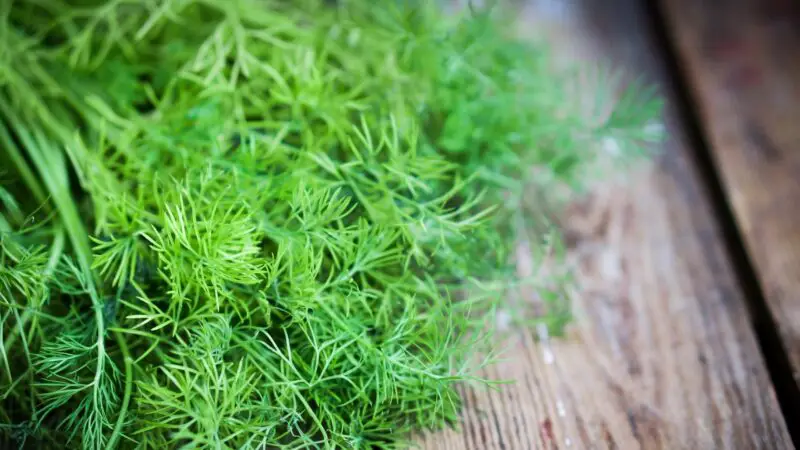
One of the benefits of dill is that it’s rich in vitamin C. The vitamin C is one of the most crucial and essential vitamins for cavies. Sadly, guinea pigs do not produce this vitamin naturally in the body.
When they do get it, they cannot store it, but instead use it up quite fast. So, it’s crucial for the cavy to get vitamin C from the supplements or food. Luckily, dill has this vitamin. Don’t overfeed the cavy with dill, it’s enough 2-3 times per week tops.
The dill also will give the cavy enough proteins and carbs as an energy source throughout the day. Not just that, but dill also offers some fibers for good digestion.
With vitamin A as an antioxidant, there is less risk of diseases. This vitamin also takes care of the heart, brain, kidneys, lungs, skin and the overall immunity too.
With the iron in the dill, the blood is healthy and strong. Iron is needed to protect from anemia and blood problems. Another powerful antioxidant in the dill is the manganese. It is the most powerful of all antioxidants for fighting diseases and illnesses.
There is also folate in this herb. Folate is a B-vitamin that is especially needed for healthy DNA and good development and growth. This is very important for little pups or fetuses. So, if the cavy is pregnant, it will benefit from the folate in this herb.
Another nutrient that keeps DNA healthy is the mineral zinc in the dill. With zinc, the immunity is always in good shape and health, wounds heal very fast, and good metabolism. It is also good for the growth and development.
With the other B-vitamins, such as the vitamin B6, there is a balance of the mood hormones. This B6 vitamin is crucial for the serotonin balance, or the good mood hormone. With this, they can have better sleep, more relaxation, less anxiety and overall less stress.
Dill has also potassium. The potassium prevents from dangerous issues like hypertension, heart diseases, reduces stress and anxiety, relieves aching muscles, and keeps muscles healthy and strong. It also creates a balance between electrolytes in the body.
Nutrition Facts of Dill
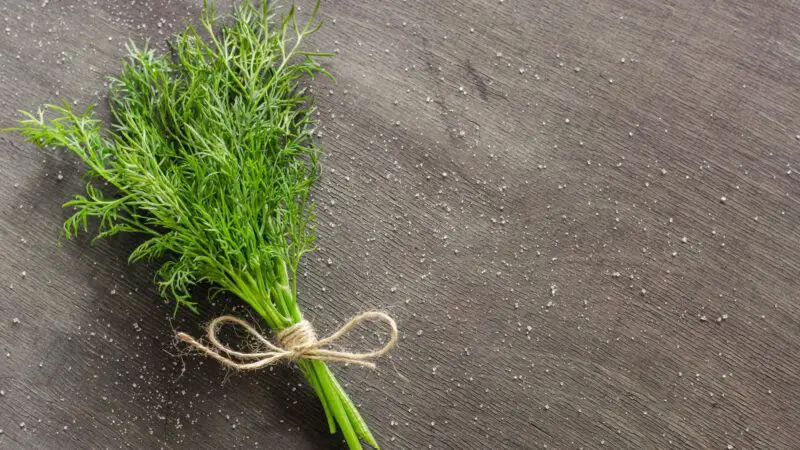
This herb is very aromatic and the aroma is indeed incredible. That’s why cavies love it so much! So, let’s see the nutritional values for a serving of 3 oz (100 g dill):
- Total of 43 calories
- Fat – 12 g
- Sodium – 61 mg
- Carbs – 7 g
- Protein – 46 g
- Fiber – 1 g
- Vitamin A – 154%
- Vitamin C – 142%
- Calcium – 21%
- Iron – 37%
- Folate – 150 mcg
- Vitamin B6 – 9%
- Copper – 7%
- Magnesium – 14%
- Manganese – 63%
- Phosphorus – 7%
- Potassium – 16%
- Zinc – 6%
Is Dill Bad for Guinea Pigs? | Possible Risks
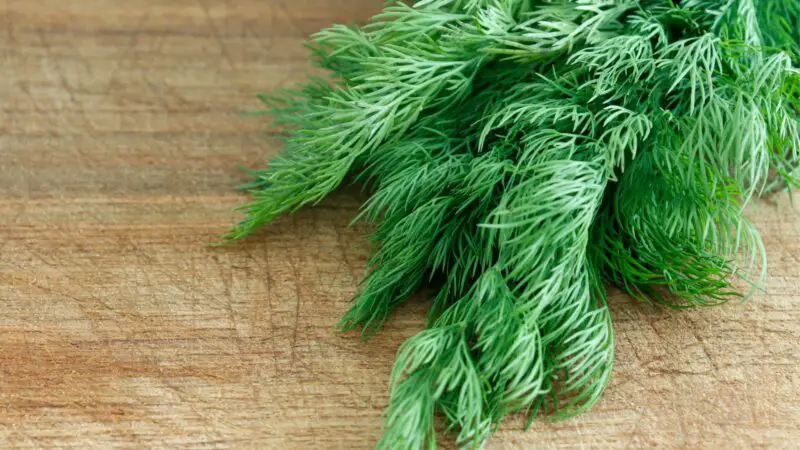
One of the risks of eating dill for guinea pigs is the amount of calcium and phosphorus it contains. These nutrients are needed in organisms to create healthy bones and strong bone tissues. That is why people say that eating dairy is good for calcium and for the bones.
But, in cavies, the calcium and phosphorus create problems. The phosphorus is not independent fully, and it has to bind with the calcium.
So, in other words, excess calcium with phosphorus creates kidney stones and bladder stones. This goes especially for rodents like the guinea pigs. Their urinary tract is fragile with excess calcium, and those urinary stones can even lead to renal failure if they are not cured in time.
Otherwise, before it gets fatal and dangerous, the first symptoms are pains during urination, changes to the volume or color of the urine.
Also, even though dill is a herb that is fit for vegetarians and herbivores, too much of it can disturb the belly of our pet guinea pig. Dill contains fibers, but eating too much fibers is not a good idea. The symptoms of excess fibers are pains in the stomach, bloating, flatulence, and loose stool.
Serving and Frequency of Dill for Guinea Pigs
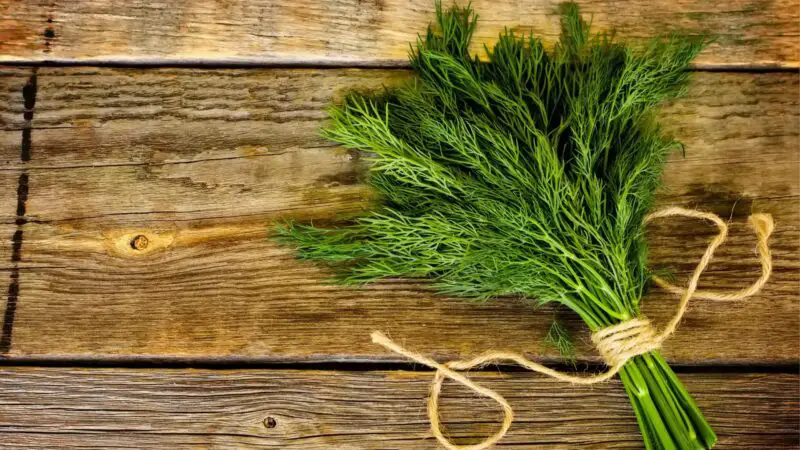
The dill can be fed to the cavy few times per week, up to 2-3 times. It is best to give new foods slowly and introduce them gradually to the cavy.
If it’s not a new food for the cavy, then every other day is enough and it won’t be harmful. The serving is usually a few bites or small branches/leaves of the dill.
Quick Facts on Dill and Guinea Pigs
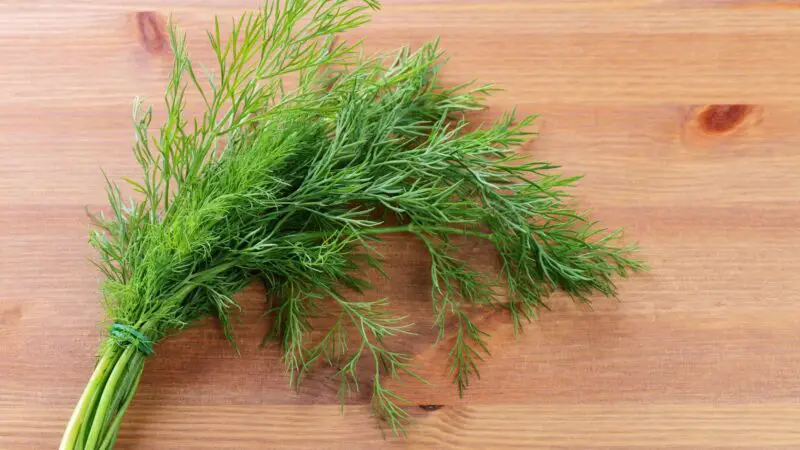
- Cavies can eat dill safely and in moderate servings.
- Dill has vitamin C. It is an essential vitamin for guinea pigs and their overall health.
- The normal serving frequency of dill is 2-3 times per week.
- Normal serving is a few bites, or a few leaves/small branches.
- Dill also contains many antioxidants to fight off diseases.
- The iron in dill keeps their blood strong.
- The B vitamin takes care of the mood hormones and it is good for the DNA as well.
- Dill has calcium and phosphorus. Because of this, it must be given in moderation.
- Too much dill can disturb the belly of the cavy with excess fibers.
We have also made a full list of foods that guinea pigs can and can’t eat (150+ Types of Foods). Be sure to also check our recommended products page for everything you will ever need to assure a happy life for your guinea pigs. Hope this information was helpful and you have found the answer you were looking for.
List of Sources
Vitamin C Requirements of the Guinea-Pig
Nutrient Requirements of Laboratory Animals: Fourth Revised Edition
The Effects of Diet on Anatomy, Physiology and Health in the Guinea Pig
